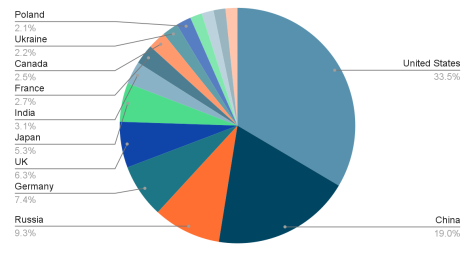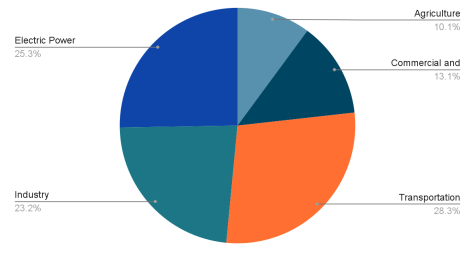A Call to Action for Climate Change
May 10, 2023
Compromise is a word many policy makers are wary of. At its very definition, compromise involves not fully getting what one wants. Yet compromise is oftentimes the only way to approach a problem. This is the case with climate change. There are not only disagreements on whether or not climate change exists, but finding a solution to it which doesn’t harm anyone seems impossible.
Between industries, the government, and the general population, everyone contributing to the climate crisis is going to need to give something up. Finding a balance between each group is a slow and laborious process, yet it is necessary to complete in order to prevent the world from slipping further into turmoil.
Industrial procedures are some of the highest contributing factors to climate change. Industrial pollution in the form of carbon emissions has constantly been a problem since the Industrial Revolution, further pushing global warming and causing climate change. Trends show that countries with high populations and production release the most CO2 emissions. In order to slow this down, industries need to recognize that more expensive manufacturing procedures that release much less CO2 will be worth it in the long run, as it will slow the destruction we are causing to our environment.

Industry causes 23% of greenhouse gas emissions in America. If this were limited, we could reduce the total amount of emissions by almost 75%. Even though this is small in the grand scheme of global carbon emissions, it is progress. If other industries follow suit, emissions would be reduced on a noticeable and global scale. This would require industries to compromise by reducing the amount of carbon-releasing procedures required to make products for a healthier world.
Policies have attempted to regulate these emissions with varying degrees of success. In 1997, the Kyoto Protocol was made between 190 nations with the goal to reduce emissions on a global scale. Yet this sparked rivalries between already developed nations and nations that were actively developing as it limited the amount of products they could produce for cheaper. Nations like India and China were practically exempt from the protocol, which caused nations like the United States to withdraw and the Kyoto Protocol to fall apart.
Other government policies include the failed “cap-and-trade” policy put in place by US President Barack Obama. This attempted to reduce emissions of CO2 by American industries. It also tried to turn renewable energy into a more profitable business venture, but was unsuccessful as Republican senators shot the bill down. In order to make any progress on a government mandated policy, the two political parties must compromise.

Republicans are reluctant to take an aggressive stance to help the environment as it might hurt the economy, yet Democrats argue that the environment is declining too rapidly to wait. In order to benefit both parties, the government can turn the race for renewable energy and lower carbon emissions into a capitalist and profitable business venture for industries by offering tax breaks for innovations. This would be a compromise that benefits all.
If the general population bands together, the total amount of carbon emissions can be reduced drastically. It would also be easier to implement a solution if it is supported by the people rather than the government as it is much less lethargic and bureaucratic. This way, change can come about much faster compared to a government driven program. It would be helpful if there was government backing on this as well to help guide it to success. If industries partnered as well to avoid price gouging in eco-friendly practices, the consumer would also be aided. This solution would also allow for economic growth, which benefits all.
Climate change is a daunting problem that is causing our world to rapidly deteriorate. If we pull out all the stops to end it abruptly, our economy and technological development will be shattered. If we allow it to continue at this pace, the natural world will be destroyed. Yet a compromise in which the government offers financial incentive for industries to offer consumers more environmentally-friendly options would benefit everyone involved. If every party involved agreed to this compromise, then climate change could be greatly reduced, stopped, or potentially even reversed.


![[Pixabay] CO2 emissions are causing extreme climate change and global warming.](https://themiawave.org/wp-content/uploads/2023/05/pollution-2575166_1920-900x599.jpg)





